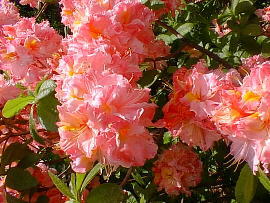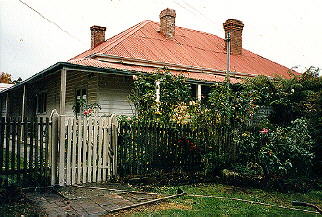TWO WRINKLY GARDENERS BUILD PARADISE IN TASMANIA
Chapter 4: The Giant in the Rose Garden
Chapter 5: Peafowls in the garden
Chapter 8: Rosie, my beautiful cat

Gay Klok
--Gay Klok--. Hobart, Tasmania Australia
THE TALE OF THE BUILDING OF A GARDEN OF EDEN IN TASMANIA
 IN
THE BEGINNING
IN
THE BEGINNING
This is the tale of two ageing people who found a new purpose for life in their "golden years." We anticipated that our last years on Earth would be full of the joys of sharing the work in our Hobart garden that we dearly loved. We also hoped to have lots of time to travel and see all the wonderful gardens around the world that in the past we had never found the time to do. The gold was to turn very quickly into a veritable rainbow of colours. The simple idea changed to a grand folly and the easing down of the pace of life developed into hours of heavy planning and enormous physical strain. And we loved practically every moment of it.
In 1985 my husband Kees and I travelled to New Zealand looking at the very beautiful private gardens that are so abundant in those islands to the East of Tasmania. Our ten days of garden visits turned out to be a very important turning point in our lives. The final garden we visited was flourishing in Ashburton" a small country town" a short distance from Christchurch. "Conniston" must be one of the most magnificent water gardens, privately owned, in the whole world. I returned to Tasmania, feeling exhilarated and happy. To me, there is nothing so exciting [ I AM getting on in years! ] as experiencing the sensations of a wonderful garden, of looking at a perfect flower and talking to a dedicated home gardener.
This mood of stimulated delight remained with me for a long time. Kees began to murmur words that suggested his retirement may be in the immediate future and a lovely dream began to flutter in my thoughts. "Why couldn't we build a water garden in our declining years?" And it was thus we began our last big adventure.
During the winter of 1986 Kees and I made several sorties into the beautiful countryside of Tasmania, searching for the "small holding" where we might build our own Paradise. First, because of the rapidly advancing years, [already we were classified as elderly] we searched in the North West of the state of Tasmania. I thought, with that wonderful, chocolate soil found in this area , we would cheat Old Man Time and see the sapling trees of our planting grow to semi-maturity. We returned to Hobart from one of these expeditions having found for sale a very small potato farm. The property had an awful cottage sitting on sixteen acres of rich, red soil. Several ponds graced the front, part of a shared irrigation system.
With a modicum of enthusiasm, we spent the three and a half hour drive home justifying all the things we found wrong with the property. "I can grow creepers all over the house," I said airily to Kees. "That the land is stripped of all vegetation is really a plus," Kees replied, "At least there is nothing growing that will have to be removed."
Later that evening, one of our sons listened quietly to our description and very softly [softly, softly catchee monkey] remarked "You will be in your sixties and seventies in ten years. That three and a half hour drive is going to be an awful drag every weekend!" And that was that.


Two previews of "Kibbenjelok" Today. I hope it wets your appetite to read
more chapters listed above
We continued to look with less enthusiasm during the next months. Kees still spoke of retirement and I continued to think that when that time came we should have something more to occupy us other than the garden in Hobart. Although this garden was very beautiful, I had, in trying to appease my plantwoman's instincts, crammed it so full of plants the poor things were on the point of becoming exhausted. Plants competing with each other looked at me every day with condemnation.
On or about July the something, 1986 - isn't it odd how we cannot quite remember those important dates? - I was sitting at home eating lunch and not quite avoiding watching Ray Martin on the Television. I was reading the "Mercury," Hobart's only daily newspaper and came across the following small advertisement.
FOR SALE CHANNEL AREA
A lifetime opportunity to purchase this magnificent older style
colonial farmhouse built in approx.1898. This four bedroom
large homestead offers you a large apple orchard and a lifetime
supply of firewood, bushland, the most astounding water views
you could imagine! This property is excellent value for money offering
a solid homestead, classic outbuildings including three picket [sic] houses.
Kees came home for lunch and I showed him the tiny advertisement. I probably only took this life changing action as proof that I did not completely waste my home time watching day time T.V. Kees said "Why don't you give them a ring?" and went out to the garden, thinking, no doubt, I would act in my normal way, all talk and no action. I picked up the telephone and rang the real estate office. The loquacious Dutch real estate salesman made an appointment for us to go down and see the "peaceful haven" the following day.
The Channel area is South of Hobart and until the last several years, a forgotten, beautiful secret. The majestic river Derwent, flowing through Hobart and out to the South Pole, is tamed into a quiet passageway by Bruny Island on one side and what is known as "The Channel" on the other periphery. From the latter part of the Nineteenth Century, hard working, battling and generally poor, settlers had moved into the Channel area. They had felled the tall, straight stringy barks and blackwoods and planted small fruit [raspberries, strawberries, red and black currants] and apple and pear trees in place of these majestic giants. They had laboured in the steep hills, looking over the sweetest views you can imagine and built their wooden houses with a fireplace in every room to keep warm in the cool winters.
The soil was rich, the climate benign and there was plenty of fish in the Channel for those strong people to become self supporting. Some made it and others did not prosper as well, but for many years they remained faithful to the area and their identity as "Channelites."

The Channel in the background
It is a childhood memory of mine of being forced to go down to the Channel to pick raspberries. There was a drastic shortage of pickers and the small fruit growers were desperate to get the fruit picked. My mother, being both a forceful woman and a Member of Parliament and a humanitarian, packed the whole family into the car and told us we had to help out by picking raspberries. My two strongest recollections from that long, hot dusty day were catching my brother kissing a friend in the middle of one of those long lines of raspberries . The other recollection was the feeling of amazement that I could never quite fill the large kerosine tin despite my absolute knowledge of working hard all day. My father, then one of the top public servants in the state, gave me his payment of two and sixpence a kerosine tin and declared "If more had gone into the tin than down your throat, you would have earned your own two and sixpence."

The house, first year
Kees and I met our salesman at the Middleton shop on a crisp, sunny, July day and the Channel looked magical. He took us up Risby road, the road on the Northern boundary of the property and pointed to thick bush on the two sides of the road. "This will be all yours and the children will be able to build log cabins out of the trees." A clear exaggeration but being a townee, [How much WAS 137 acres?]I believed him and started to feel very frightened of bush fires.
He moved us a little way further up the gravel road, "And this paddock is yours and look beyond that, there is the house." I looked over a reasonable stretch of grass and saw some mammoth Radiata pine trees and apple trees and apple trees and apple trees and from the middle of the apple trees a red tin roof poked out. A whisp of smoke floated from a red brick chimney. I glanced at Kees and fancied I could see a tiny gleam of excitement in his eyes.
| Wirefly |
We climbed into the car and I said, "Let's see this little bit of Paradise." That is how it came to be that two wrinkly gardeners swooped in on that quiet orchard farm and cried "Yes! We will buy this little piece of Paradise for our very own." And the female of the two was heard to say quietly, " We will build a water garden. Such a beautiful garden and leave some of our body and soul in Nirvana on Earth
New! Photos from the garden EnjoyMore photos taken in 2007
Roses bloom in the Summer Garden
Sign
My Guestbook View
My Guestbook ![]()
The second phase of this story may be found at https://members.tripod.com/~klok/EDEN.HTM
The story of the building of a Garden
The wrinklies have collected some awards as they travelled the garden paths. If you would like to see these click here
We are proud we were picked to be a featured site with
| PREMIUM MEMBER |
||
Space for this web page is provided as a service to Tripod members.
The contents of this page are the responsibility of its creator, not Tripod, Inc.
